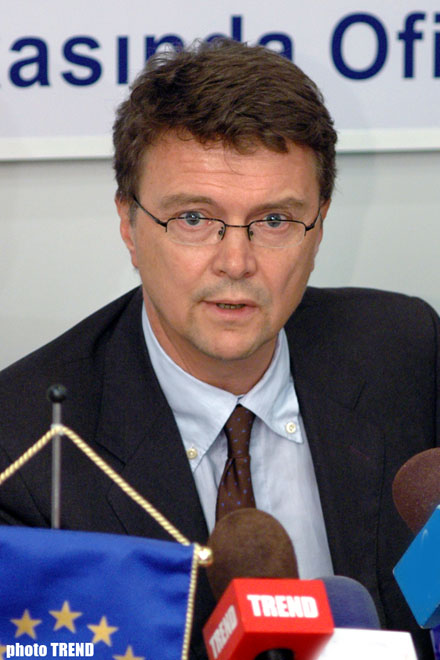France, Strasburg / Тrend corr A. Maharramli, S. Ilhamgizi / Trend's interview with the chair of the Ago Monitoring Group of the Ministerial Committee of the Council of Europe, permanent representative of Sweden to the Council of Europe, Pier Sjorgen..
Question: How well does Azerbaijan implement its obligations to the Council of Europe?
Answer: Azerbaijan made great progress in fulfilment of its obligations to the Council of Europe (CE). The progress made especially in legislation after Azerbaijan entered the CE should be recognized, but it still requires more improvement. The Ago Monitoring Group constantly negotiates with the Azerbaijani Government, opposition, NGOs, Ombudswoman and other structures and institutions of the country, as well as with the Azerbaijani permanent representation in the CE.
I will speak on three areas connected to Azerbaijan which are considered to be important - judicial system, media, and election issues.
Last year we paid special attention to the judicial system of Azerbaijan. A round table on ways of improvement to the judicial system, independence of attorneys, prosecutors and judges, their education and training took place in Baku for this purpose. Different supportive programs and events will be implemented in this field.
Along with a continuation of the work in the judicial system, special attention will be paid to the mass media. We are concerned about the state of the media in Azerbaijan and we believe that the situation should be improved. We are critical about the arrests of journalists, long-term arrests. We are alarmed about the fact that several journalists were arrested within a year. This issue is of great importance for the CE, as it is directly linked to freedom of expression. We want changes to be made in some laws envisaging responsibility for defamation.
The issue of training journalists is also unresolved. Special programs on support to train amongst journalists are planned to be implemented.
The third significant field we are working on is elections. Next year will be remarkable for Azerbaijan as the presidential elections will take place. We want the election to be free and democratic. For that purpose first of all the items of the Election Code must completely comply with the recommendations of the Venice Commission. An intensive dialogue on the improvement of the Election Code is underway between the Azerbaijani Government, Azerbaijani Parliament and the Venice Commission. The composition of election committees is the centre of attention. Freedom of meetings and how this is reflected in legislation is very important. The second very important point in elections is that in order to provide transparency and justice, elections should be held under control. The presidential elections to take place in Azerbaijan will naturally be controlled by an international observation mission.
Political prisoners are still a problematic matter. The members of the working group state that there are political prisoners, representatives of the Government and NGOs in Azerbaijan. We very positively treat that working group which is a joint initiative of the Government and civil society, but we would like to see its more active work.
Question: How do you assess the results of the round table on the Election Code which took place in Baku in November?
Answer: According to the Venice Commission, a good round table took place in Baku in November. They said in the Commission that the round table and workshops went in the right direction. I think, through discussions over the composition of election committees and election complaints are advancing in the right direction, there are still uncoordinated issues and the work is not yet complete.
Question: Which questions were reflected in the report developed during the Ago Group's visit to Azerbaijan in July this year?
Answer: In July of this year the report with conclusions we made during the visit was submitted to the CE Ministerial Committee. We paid special attention to the judicial system.
Question: When will your next visit to Azerbaijan take place?
Answer: Our next visit is planned to take place in the spring of next year, but the exact date for the visit has not been set yet. During the visit we will focus on the elections in Azerbaijan, the media and the judicial system. The Nagorno-Karabakh problem and persons considered to be political prisoners will also be discussed.
Question: What priority is the settlement of the Nagorno-Karabakh conflict for the Ago Group?
Answer: The Nagorno-Karabakh issue is important for us. We attentively observe the conflict as far as possible. In order to get information on the course of peaceful negotiations we always keep in touch with the OSCE Minsk Group. But our mandate envisages only support to a peaceful settlement process and formation of an environment necessary for a peaceful settlement. We deal with the issue only in terms of human rights.
Question: Armenia states that religious elements lie in the root of the conflict and tries to exaggerate this side of the issue. How much does that comply with the dialogue among religions which is so encouraged by CE?
Answer:We believe thatdialogue among religions sometimes may be an element of conflict settling. However, in most conflict situations that is just a part of the problem. Conflicts have political, historical and other aspects and special attention should be paid to them. The visit of a group of Azerbaijani cultural people to Nagorno-Karabakh and Armenia this year attracted my attention. Such initiatives are important for encouragement of talks.






